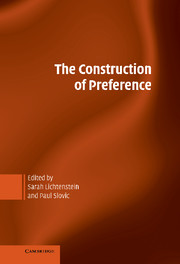Book contents
- Frontmatter
- Contents
- Contributors
- Preface
- Acknowledgments
- I INTRODUCTION
- II PREFERENCE REVERSALS
- 2 Relative Importance of Probabilities and Payoffs in Risk Taking
- 3 Reversals of Preference Between Bids and Choices in Gambling Decisions
- 4 Response-Induced Reversals of Preference in Gambling: An Extended Replication in Las Vegas
- 5 Economic Theory of Choice and the Preference Reversal Phenomenon
- III PSYCHOLOGICAL THEORIES OF PREFERENCE REVERSALS
- IV EVIDENCE FOR PREFERENCE CONSTRUCTION
- V THEORIES OF PREFERENCE CONSTRUCTION
- VI AFFECT AND REASON
- VII MISWANTING
- VIII CONTINGENT VALUATION
- IX PREFERENCE MANAGEMENT
- References
- Index
5 - Economic Theory of Choice and the Preference Reversal Phenomenon
Published online by Cambridge University Press: 05 June 2012
- Frontmatter
- Contents
- Contributors
- Preface
- Acknowledgments
- I INTRODUCTION
- II PREFERENCE REVERSALS
- 2 Relative Importance of Probabilities and Payoffs in Risk Taking
- 3 Reversals of Preference Between Bids and Choices in Gambling Decisions
- 4 Response-Induced Reversals of Preference in Gambling: An Extended Replication in Las Vegas
- 5 Economic Theory of Choice and the Preference Reversal Phenomenon
- III PSYCHOLOGICAL THEORIES OF PREFERENCE REVERSALS
- IV EVIDENCE FOR PREFERENCE CONSTRUCTION
- V THEORIES OF PREFERENCE CONSTRUCTION
- VI AFFECT AND REASON
- VII MISWANTING
- VIII CONTINGENT VALUATION
- IX PREFERENCE MANAGEMENT
- References
- Index
Summary
A body of data and theory has been developing within psychology that should be of interest to economists. Taken at face value the data are simply inconsistent with preference theory and have broad implications about research priorities within economics. The inconsistency is deeper than the mere lack of transitivity or even stochastic transitivity. It suggests that no optimization principles of any sort lie behind even the simplest of human choices and that the uniformities in human choice behavior that lie behind market behavior may result from principles that are of a completely different sort from those generally accepted. This chapter reports the results of a series of experiments designed to discredit the psychologists' works as applied to economics.
The phenomenon is characterized by the following stylized example. Individuals under suitable laboratory conditions are asked if they prefer lottery A to lottery B as shown in Figure 5.1. In lottery A a random dart is thrown to the interior of the circle. If it hits the line, the subject is paid $0, and if it hits anywhere else, the subject is paid $4. Notice that there is a very high probability of winning, so this lottery is called the P bet, standing for probability bet. If lottery B is chosen, a random dart is thrown to the interior of the circle, and the subject receives either $16 or $0, depending on where the dart hits. Lottery B is called the $ bet because there is a very high maximum reward.
- Type
- Chapter
- Information
- The Construction of Preference , pp. 77 - 94Publisher: Cambridge University PressPrint publication year: 2006
- 64
- Cited by



